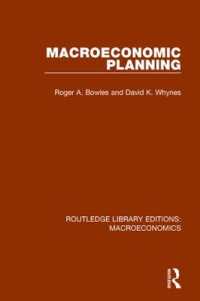- ホーム
- > 洋書
- > 英文書
- > Business / Economics
Full Description
Ecohydrology of Kerala: River Catchments and Coastal Backwaters presents 20 years of research to provide suggestions for sustainable management solutions for issues surrounding the urbanization of the rivers of Kerala. This helps identify major issues and develop management strategies. Themes explored include biogeochemistry of rivers/estuarine systems, productivity and trophic status, biology: fauna and flora, biodiversity, threats and conservation, invasive species and impact on riverine ecology, landscape/land use/land cover change in the catchment, socioeconomic status of catchment population, economic and livelihood activities along the river courses/estuaries (river and estuarine tourism, sand extraction, fisheries), pollution monitoring and assessment, impacts of climate change, and more.
This book can be used as a tool in the holistic management of resources, and to devise proper mitigation measures. The content of the book is a model for other tropical regions and countries with rapidly developing economies and populations
Contents
Ecohydrology of river catchments and coastal backwaters in Kerala, India: An introduction and synthesis
Geomorphic setting and geologic features of Kerala and their link to eco-hydrology of the region
Hydrological setting of Kerala
On the drivers of summer monsoon rainfall over Kerala
Riparian vegetation in Kerala's river basins: Diversity, ecological functions and restoration prospects
Forests and its biodiversity in the Western Ghats of Kerala
Hydromorphic acid saline soils of Kerala: An ecohydrology based fertility assessment
Current insights on biota from the submarine groundwater discharge(SGD) ecosystem
Coastal sediment microbiome: Structural and functional diversity of bacteria and archaea in Vembanad Lake of Kerala
What makes the coastal lakes a source of methane? Biogeographic pattern of community structure and functions of methanogenic archaea in Vembanad Lake, Kerala, India
Land use/land cover change detection for climate-smart sustainable management in the selected river basins of Kerala, India
Assessing submarine groundwater discharge and nutrient fluxes along the southwest coast of India
Impact of natural control factors, land use and a large pilgrim centre on the biogeochemistry of suspended particulate organic matter in the Pamba River, Kerala, India
Trophic status and fate of nutrients and organic matter in the Vembanad estuary related to land use in the Pamba river and other contributing rivers
Identification of pollution potential zones of a coastal lake system using GIS techniques
Integrated Coastal Zone Management practices and cumulative environmental impacts: The case of Vembanad Lake, a tropical estuary in India
Collaborative evolutionary governance of estuaries in Kerala, India
Challenges of water governance related to human-induced nutrient input in surface water bodies: Lessons learned from case studies in India, Indonesia and Germany
-

- 電子書籍
- 偽りの武神【タテヨミ】第55話 pic…
-

- 電子書籍
- 七つの魔剣が支配する【ノベル分冊版】 …
-

- 電子書籍
- 月刊少年ガンガン 2021年3月号 月…
-

- 電子書籍
- ONE PIECE カラー版 89 ジ…




